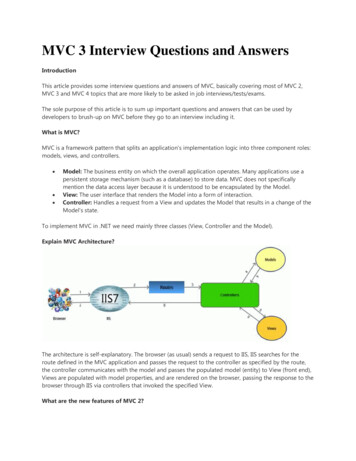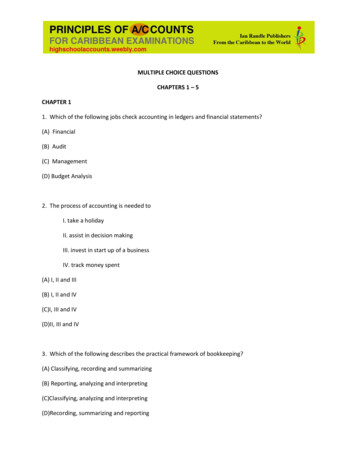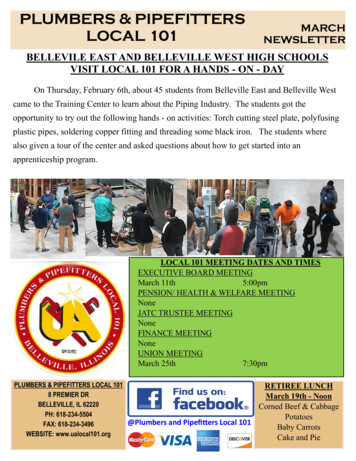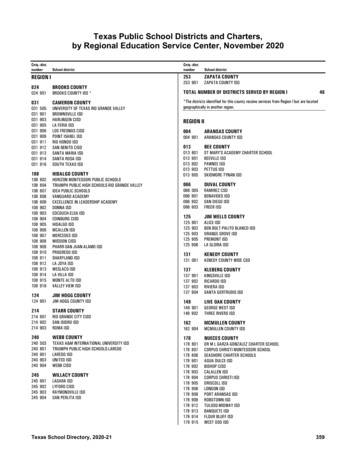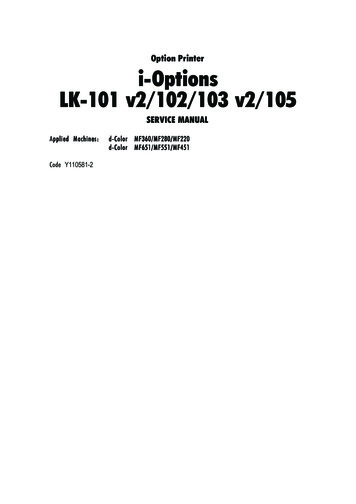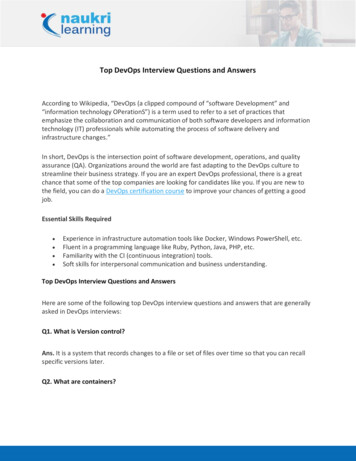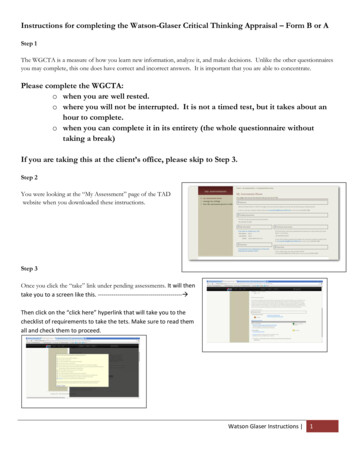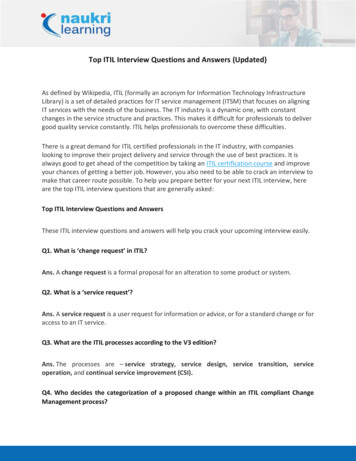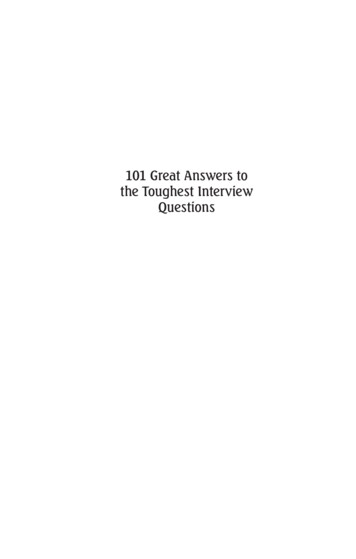
Transcription
101 Great Answers tothe Toughest InterviewQuestions
101 GreatAnswersToughestInterview Questionsto the25th Anniversary EditionByRon Fry
Copyright 2016 by Ron FryAll rights reserved under the Pan-American and InternationalCopyright Conventions. This book may not be reproduced,in whole or in part, in any form or by any means electronic ormechanical, including photocopying, recording, or by any information storage and retrieval system now known or hereafterinvented, without written permission from the publisher, TheCareer Press.101 Greatest A nswers to the Toughest Interview QuestionsTypeset by Eileen MunsonCover Design by Howard Grossman/ 12E DesignCover photo by rawpixel.comPrinted in the U.S.A.To order this title, please call toll-free 1-800-CAREER-1 (NJand Canada: 201-848-0310) to order using VISA or MasterCard,or for further information on books from Career Press.The Career Press, Inc.12 Parish DriveWayne, NJ 07470www.careerpress.comLibrary of Congress Cataloging-in-Publication DataCIP Data Available Upon Request.
Contents Introduction. 7You Are in ChargeChapter One. 19The Interview ProcessChapter Two. 45Who Are You?Chapter Three. 55So, Tell Me About YourselfChapter Four. 75Questions About Your EducationChapter Five. 87Questions About Your ExperienceChapter Six. 113Questions About Core CompetenciesChapter Seven. 129Questions About Your Current (or Last) Job
Chapter Eight. 147So Why Us?Chapter Nine. 167Questions About Your Personal LifeChapter Ten. 189Questions to Wrap Things UpEpilogue. 201I’ve Got a SecretIndex. 203
ntroductionYou Are in ChargeI started writing the first edition of this book in 1989, and theparallels with that year are a little eerie.The unemployment rate then and now is 5.3% and, thenand now, has fallen steadily for two years. The 1989 economyhad recovered from a 1982 recession and falling oil prices, andweathered a 1987 market crash. Our “ho-hum economy,” as theNew York Times recently characterized it, is still recovering froma 2008 market crash and the Great Recession. The price of oilhas fallen precipitously.Unemployment figures and pundits paint a contrasting picture—while the job market for current or recent college grads is considered the best in a decade or more, there are 6.5 million people“working part time for economic reasons.” In other words, 6.5million people who would prefer to work full time but can’t finda full-time job.Whether we are in a booming economy or a recession, mostof the things you need to know and do during the interview process do not really change. In the 27 years since I wrote the firstedition, an ever-changing job market has morphed from a seller’s(employee-friendly) market to a buyer’s (employer-friendly) market and back again. But in good times and bad, the power thisbook has given interviewees—whatever their ages, skills, or qualifications—has continued to grow.7
101 Great Answers to the Toughest Interview Questions I certainly couldn’t boast of my own interviewing skills beforeI wrote this book. On the contrary, I had often not gotten jobs forwhich I was eminently qualified. So I spent quite a lot of timelearning all the mistakes you could possibly make, having madeeach one of them—twice.Now, as a veteran of the other side of the desk as well (I’vehired hundreds and interviewed thousands), I can tell you thatinterviewing is more serious business than ever before.Employers are looking for “self-managing” employees—people who are versatile, confident, ready and able to work with ateam, and not afraid to roll up their sleeves, work long hours,and get the job done. “That’s me,” you chortle. Congratulations.But you won’t get the chance to prove yourself on the job withoutmaking it through the interview process.You can’t cheat on these testsThere has been one significant development since the last editionof this book. According to the Wall Street Journal, hundreds ofcompanies—including 457 of the Fortune 500—are using someform of “personality” testing that aims to correlate specific personality traits with success in a particular job. One test vendor,Infor, claims to assess more than a million candidates a month.While tests such as Myers-Briggs and the MMPI (MinnesotaMultiphasic Personality Inventory) were popular during the 1960sand ’70s, we are clearly in a new age that Time magazine recentlynoted “is being driven by a collision of two hot trends: Big Dataand analytics The result is a mostly unchallenged belief that lotsof data combined with lots of analytics can optimize pretty muchanything even people. Hence, people analytics.”You may now have to take the DISC Assessment, which willgrade you in four areas—Dominance, Defiance, Steadiness, andConscientiousness. Or the Hogan Personality Inventory, whichassesses five. The 16PF measures 16 “normal-range” personalitytraits and five “second-order” traits. The California PsychologicalInventory uses 18 scales in four classes to determine what the test 8
You Are in Chargetaker will do in specific on-the-job situations. And the CaliperProfile will assess 25 personality traits related to job performance. The winner of this personality numbers game so far isGallup’s Clifton Strengthfinder, which measures 34 traits (but ismost interested in your top five).I know from experience that you cannot “beat” these tests.If you try to choose the answers you believe are “obviously” theones showing your leadership, motivational, or team-buildingskills, you will not succeed. Since you can’t really prepare forthese tests, relax and try to answer the questions honestly. Mostsuch tests are merely trying to identify the jobs for which your“personality type” is best suited. And at most companies, theyare merely one component of the interview process.I will leave it to others to argue whether it is possible (or desirable) to accurately test for job-specific “success traits.” Whateveryou believe about this new trend, it is clearly another obstaclemany of you will need to hurdle.Interviewing was never easy, and right now it is as hard asever. Companies are taking far longer to make hiring decisions,and only after subjecting prospective employees to these testsand scheduling more and longer interviews.But of all the tools in your professional arsenal, your abilityto shine in that brief moment in time—your initial interview—can make or break your chances for a second go-around, and,ultimately, dictate whether you’re even given a shot at the job.Practice still makes perfectLike playing the piano, interviewing takes practice, and practicemakes perfect. The hours of personal interviewing experience—the tragedies and the triumphs—as well as my years as an interviewer are the basis for this book. I hope to spare you many of theindignities I suffered along the way, by helping you prepare forthe interview of your worst nightmares—at a comfortable removefrom the interviewer’s glare.9
101 Great Answers to the Toughest Interview Questions Will you have to answer every question I’ve included?Certainly not—at least, not in a single interview. But chances are,the questions tomorrow’s interviewer doesn’t ask will be on the tipof the next interviewer’s tongue. Why? It’s a mystery.I didn’t realize 25 years ago that I would start a competitivepublishing battle to see how many interview questions could befeatured in a single book. There were always more than 101 questions in my book once one considered all the variations that Ilisted. But the success of that first edition led to an unfortunatenumbers game. Soon there was a book touting 201 questionsand answers, then 301, then 500, and, in a final burst of oneupmanship, 501.These numbers really don’t matter, especially if a single wordchange in one question magically transforms it into another. Soplease don’t count the questions in this edition or worry that youneed to look at these other books to get a more “complete” list.Believe me, the ones in this book will suffice!Become an interview artistMost interviewers are not trying to torture you for sport. Theirmotive is to quickly learn enough about you to make an informeddecision—should you stay or should you go? By the same token,if you know what they’re looking for, you can craft your answersaccordingly (and reduce your own fear and anxiety at the sametime).I hope you’ll take it a step further and use these questions asthe basis for some thoughtful self-exploration. You’ll need to beprepared to think for yourself—on your feet, not by the seat ofyour pants.While it is certainly competitive, the interview process is nota competition. Rather than thinking of yourself as an athlete trying to “out-answer” the other candidates, consider an interviewyour chance to be an artist—to paint a portrait of the person youare, the candidate any company should like, respect and wantto hire. 10
You Are in ChargeChapters 1 and 2 offer a detailed discussion of the work youneed to do and the things you need to think about long before youstrut into your first interview. Interviewing may not be 99 percentpreparation, but it’s certainly 50 percent.In Chapters 3 through 10, we’ll get into the meat of thebook—the questions for which you must prepare and the answersmost interviewers are hoping to hear. Each question is generallyfollowed by one or more subheadings:What do they want to hear?(What information is the interviewer seeking?)CD Thumbs Up(What’s a good answer?)Thumbs Down(What’s a poor answer?)I’ve listed the follow-up questions you should expect or variationsan interviewer may substitute after many of the questions.The questions in this book are grouped by type; they are notin some suggested order. Many of the questions in chapters 8 or10, for example, may well be some of the first questions asked inevery interview! So read the entire book and prepare for all of thequestions in any order.Despite the emphasis on “great answers,” I do not recommend rote memorization. Trotting out a staged, “textbook”answer to a question is not the point of the interview process or of this book. It is actually more important to concentrate onthe “What do they want to hear?” section after each question, tohave an understanding of why the interviewer is asking a particular question and what you need to do to frame a winning answer.The “thumbs down” after many of the questions indicateanswers that will make the average interviewer cringe and thebusy interviewer simply suggest you try another firm.11
101 Great Answers to the Toughest Interview Questions Oh, no, you didn’t!I’m going to assume that you have already been on enough interviews (or, if you’re a recent graduate, read enough interviewingbooks), to know that there are rules to follow during interviews.So I’m not going to discuss most of them here.But there is a list of “no-no’s” that are so important, failing toavoid them can virtually doom any chance you have of securingthe job before the interview even starts. Given their seriousness,I thought it prudent to remind you of them:“What does this company do?”A key part of the interview process is preparation—researchingthe company, industry, and position, preparing pertinent questions, being ready to sprinkle your knowledge into the conversation. So failing to do any of this will not impress most interviewers.I have had candidates ask me what exactly my company did.The immediate and obvious answer: Not hire them.On time and looking goodFor many interviewers, showing up late is immediate cause forcanceling the interview. It doesn’t matter that traffic backed up,your cat threw up a hairball, or you just got lost in the elevator.Being on time is not racing down the final corridor withmoments to spare. Some interviewers agree with New York Giantsfootball coach Tom Coughlin, who declared that team memberswere late for meetings if they didn’t show up fifteen minutes early.Poor grooming is a basic turnoff. Wearing so much perfumeor cologne that a gasping interviewer lunges for the windowisn’t recommended. Nor is wearing more makeup than a runwaymodel, clanking along with a pocketful of change or an armloadof bangles and bells, or sporting an unkempt beard (or, for someinterviewers, even fashionable stubble). 12
You Are in ChargeGiven the tube tops, sneakers, short skirts, and patternedstockings I’ve seen waltz through my door (and all on one candidate!), some of you may need to review the appropriate dress forevery interview.While women no longer need to sport a black business suitand pearls, dressing tastefully in professional apparel is still amust. And that black suit will still work in most environments.Men should wear a white or light blue shirt, conservative suit,silk tie, and shined dress shoes.No one should think of wearing ties that glow in the dark,T-shirts advertising anything (but especially not X-rated), or anyclothes even you know are totally unprofessional.Lies, damn lies, and statisticsIf you lie about anything—especially where and when you worked,what you did, where and when (or even if) you attended college—you will be caught. No matter how lowly the job, there are significant expenses involved with hiring someone to perform it. Socompanies will take the time to check out references. The higherup the food chain you climb, the more intense their scrutiny.Even if the lie is inconsequential, the very fact that you liedwill, in virtually all instances, be immediate grounds for dismissal.Lacking a particular skill or experience may not automaticallyexclude you from getting the job. Lying about it will. Just ask former NBC news anchor Brian Williams about the consequences of“shading” the truth or “misremembering” an experience.While honesty may be the best (and only) policy, it is not necessary to share anything and everything with your interviewer.Anything you do in the privacy of your own home is not something you need to share.And do be smart enough, when asked what interests youabout the job, not to answer, “Heck, I just need a job with benefits. I’m three months along and can’t wait until my maternity leavestarts.”13
101 Great Answers to the Toughest Interview Questions The eyes have itDon’t underestimate the effect of your own body language onthe interviewer. While many people don’t mean what they say orsay what they mean, their nonverbal actions reveal exactly whatthey’re feeling. According to studies, more than half of what weare trying to communicate is being received nonverbally.To many interviewers, your failure to “look them in the eye”indicates you have something to hide, as does being overly fidgetyor nervous. Greet the interviewer with a firm handshake, facehim or her, sit straight up, and, of course, look them in the eye.Breaking eye contact occasionally is also a good idea. Staringwithout pause for more than a few seconds will make almost anyone nervous.Likewise, interviewers are looking for people who are enthusiastic about what they do, so sighing, looking out the window, orchecking your watch during a question will not create the rightimpression. If you don’t seem interested in the job, why shouldthey be interested in hiring you?But you can be too aggressive. One candidate said to me,barely five minutes into our interview, “I’ve got three other offersright now. What can you do for me?”I showed him where the exit was.Yes, you need to be confident, enthusiastic, and cheerful (andbrave and clean and reverent ), but, as this example clearly illustrates, you can overplay your handAvoid becoming defensive when there doesn’t appear to bea reason: The interviewer asks what she thinks is a simple question and you act as if she has accused you of a crime. You start tosweat, hem and haw, and try to change the subject.What are you hiding? That’s what the interviewer will bethinking. And if you aren’t actually hiding anything, why are youacting so defensively?Try to make every minute of your interview a positive experience—introducing negativity of any kind is virtually guaranteed 14
You Are in Chargeto dim your chances. (Which is why the interviewer may introducenegativity, just to see how you handle it.) So complaining aboutyour last job, boss, duties or even the elevator ride upstairs isgetting yourself off on the wrong foot. And this is my momThere should be a new reality series featuring the bizarre behavior of some interviewees, as they chew, burp, scratch, swear, cry,laugh, and scream their way into our hearts. Interviewees haveshown up drunk or stoned, brought their mothers with them,fallen asleep, even gone to the bathroom and never returned.Keeping your cell phone on during the interview qualifies asinappropriate behavior. Actually receiving or making a call ranksas bizarre.Remember what the interviewer is thinking: If this is yourbest behavior, what (gasp!) do I have to look forward to?Eat, drink, go homeInterviewing over lunch is a situation fraught with potential dangers. Slurping spaghetti or soup or wiping barbeque sauce off yourtie is simply not attractive, even if you are. Ordering the most (orleast) expensive item on the menu sends an unwelcome message.And what happens when the French dish you didn’t understandbut ordered anyway turns out to be something you can’t even lookat, let alone eat?If you can’t avoid a lunch interview (and I would certainlytry), use your common sense. Order something light and reasonably priced—you’re not really there for the food, are you?Remember what Mom told you—keep your elbows off the table,don’t talk with your mouth full, and put your napkin in your lap.Don’t drink alcohol (even wine), don’t smoke (even if your hostdoes), don’t complain about the food (even if it was lousy), anddon’t forget that this is still an interview!15
101 Great Answers to the Toughest Interview Questions “And then I worked for oops!”Throughout this book, I will attempt to give you the ability to formulate answers that respond to what the interviewer really wantsto know. The more responsive your answer is to the interviewer’sstated (or unstated) needs, the better. Since the best answers are“customized” to fit the company’s needs and your qualifications,it’s often difficult, if not impossible, to say that a particular answeris “right” or “wrong.” But there are answers that are clearly wrong:Ö Any answer, no matter how articulate and specific,that fails to actually answer the question asked.Ö Any answer that reveals you are clearly unqualifiedfor the job.Ö Any answer that provides information that doesn’tjibe with your resume and/or cover letter. (Don’tlaugh. I, for one, have proudly given details about ajob I left off my resume. The interviewer didn’t laugheither.)Ö Any answer that reveals an inability to take respon-sibility for failures, weaknesses, poor decisions, andbad results or that tries to take full credit for a project to which others clearly contributed.Although many interviewers will not consider inappropriatedress, poor grooming, or a bit too much candor an automatic reason for dismissal, an accumulation of two or more such actionsmay force even the most empathetic to question your suitability.(Some items, of course, such as dishonesty, may well lead to animmediate and heartfelt, “Thank you please leave.”)Do your best Sherlock HolmesYou also need to always gauge the interviewer’s response to whatyou’re saying, not just the answers you’ve given but the questionsyou’ve asked. Listen for verbal clues and watch the body language 16
You Are in Chargethat will often tell you how you’re really doing. Again, you don’twant to kill a potential job because you were overly aggressive onthe interview.If you know what to look for, you’ll get extra clues from thebody language of an interviewer:Lack of eye contact or “shifting” eyes are usually seen as asign of dishonesty or, at best, discomfort: “Mr. Interviewer, are youplanning any more layoffs?” {squint, shift, squirm, blink ) “Uh,no, Jim. So, how about dem Bears?”Raised eyebrows indicate disbelief or even mild distain, alongthe lines of “Oh, really?”/“You don’t mean that, do you?”/“Gee,how’d you figure that out?”/“You don’t actually expect me to buythat, do you?”A smile at the wrong time can be a sign of discomfort or anindication of a complete lack of appropriate social skills.A tightly clenched jaw, pursed lips, or a forced smile may indicate stress, anything from a boss’s reprimand to an early morningfight with a spouse. While the cause is clearly not your problem,you need to make sure the effect does not become a distractionduring your interview.“Closed” positions of the hands and arms—clenched fists,arms folded across the body—are not positive. They may alsoindicate boredom or negativity.An interviewer who is slumping or leaning back in his chairmay be showing disrespect, arrogance, or disinterest. It is surelya sign that you have to ask a question to get him back into theconversation.If the interviewer keeps nodding rapidly for an extendedperiod of time while you are asking or answering a question, itmay be shorthand for “Be quiet and let me say something now.”Doodling, chewing on a pencil, scratching, playing with one’shands, moving things around on a desk, or acting distractedare typical signs of nervousness. Don’t interpret it as anythingmore than nerves unless something else tips you off. Again, ask aquestion to get the focus back on you or, even better, a question17
101 Great Answers to the Toughest Interview Questions about her. Most people like to talk about themselves, especially anot-too-experienced interviewer who seems to be nervous aboutinterviewing you, believe it or not!But don’t overanalyze the situation. An interviewer vigorously rubbing her eyes may just be telling you she didn’t getenough sleep last night or is suffering from allergies.Let’s get ready to rumbleMost job candidates think of the interview in completely thewrong way—as an interrogation or police lineup. And they seethemselves as suspects, not as the key prospects they really are.This book will show you that you are, to a very large degree,in charge of the interview. It will convince you that you are therenot only to sell the company on you, but to make sure that you aresold on them. It will give you the powerful questions that will workwhatever your age, whatever your experience, whatever your goals.Despite my sterling reputation with employment offices, thefirst edition of this book became a bestseller. In fact, it continuesto sell, year after year. I don’t pretend to know why it has done aswell as it has, but I will hazard a guess: It is simple, straightforward, practical, and written in a welcoming and humorous style.(Okay, I suppose that counts as four and a half guesses.)And it has clearly helped literally hundreds of thousands ofcandidates prepare for every type of interview and every style ofinterviewer. I’m pleased and proud that this new edition will helpmany more of you!It will not, however, spend very much time preparing you forthe questions you need to ask during the interview. Luckily foryou, I’ve already written the companion book to this one—101Smart Questions to Ask on Your Interview—whose sole purpose isto do exactly that. And I have just revised it as well. Using thesetwo books together, you will be amply armed for any interviewand any interviewer.—Ron Fry 18
hapterThe Interview ProcessYou’ll probably have to go through more interviews than yourpredecessors for the same job, no matter what your level of expertise. Knowledge and experience still give you an inside edge. Butthese days, you’ll need stamina, too. Your honesty, your intelligence, your mental health—even the toxicity of your blood—maybe measured before you can be considered fully assessed.You may also have to tiptoe through a minefield of differenttypes of interview situations.Do all you can to remain confident and flexible and readywith your answers. No matter what kind of interview you findyourself facing, this approach should carry you through with flying colors.Let’s take a brief tour of the interview circuit.Is this the person to whom I am speaking?Telephone screening is an effective tactic used by many interviewers, but some rely on the strategy as a primary means of qualifying candidates. For many of these interviewers, the in-personinterview is little more than an opportunity to confirm what theyfeel they’ve already learned on the phone.Interviewers who typically fall into this category are entrepreneurs, CEOs, high-level executives, and others short on time19
101 Great Answers to the Toughest Interview Questions and long on vision. Their guiding philosophy could be summedup as: “I have a personnel problem to solve, and I don’t plan towaste my valuable time talking in person to anybody but the verybest.”A telephone screener is also often the dominant interviewer atsmall- to mid-size companies where no formal Human Resources(or Personnel) department exists or where such a department hasonly recently been created. The primary objective of the telephone screener is to identify reasons to remove you from activeconsideration before scheduling an in-person meeting.Among the common reasons for abrupt removal from thetelephone screener’s short list: evidence that there’s a disparitybetween your resume and actual experience, poor verbal communication skills, lack of required technical skills.If you are expecting a call (or calls) from telephone screeners, make sure family members know how to answer the phone.Hint: A sullen “Huh?” from your teenage son or brother is notthe best way. And by all means avoid cutesy answering machinetapes: “Hi!” [giggle, giggle] “We’re upstairs getting nasty!” [giggle,snort] “So leave a message, dude.”What could be better than answering questions from thecomfort of your own home?For starters, conducting a telephone interview has cost youtwo valuable tools you can employ during in-person interviews:eye contact and body language. You’re left with your skills, thefacts on your resume, and your ability to communicate verbally.Don’t be discouraged. Always project a positive image throughyour voice and your answers. Don’t overdo it, but don’t let thetelephone be your undoing either. If your confidence is flagging,try smiling while you listen and speak. Sure, it might look silly—but it absolutely changes the tone and timbre of one’s voice. I alsolike to stand, even walk around, during a telephone interview. Itseems to simultaneously calm me down and give me more energy.You have a right to be prepared for any interview. Chancesare the interviewer will call you to set a time for the telephone 20
The Interview Processinterview. However, if she fires a question at you as soon as youanswer the phone, there’s nothing wrong with asking her to callback at a mutually agreeable time. You need to prepare your surroundings for a successful interview.Next to the phone, you’ll want to have a copy of your resume(which you’ve quickly reviewed), the cover letter you sent oremailed, a list of questions you’ve prepared for them, a notepad,your research materials on that company, and a glass of water.You will also want to have already answered nature’s call—yousurely don’t want to excuse yourself in the middle of the interview—and placed a “Do Not Disturb” sign on your door, so family members or roommates don’t interrupt. You never want to putthe interviewer on hold for any reason.Are you wheat or chaff?Many personnel professionals fall into a different category:human screens. For them, interviewing is not simply a once-aquarter or once-a-month event, but rather a key part of their dailyjob descriptions. They meet and interview many people, and aremore likely than a telephone screener to consider an exceptionalapplicant for more than one opening within the organization.A primary objective of a human screen is to develop a stronggroup of candidates for managers (the third kind of interviewer) tointerview in person. To do this, of course, they must fend off manyapplicants and callers—a daunting task, because the humanscreen or the department in which he works is often the only contact provided in employment listings or posts.Among the most common reasons for removal from a humanscreen’s “hot” list are: lack of the formal or informal qualificationsoutlined in the organization’s job description; sudden changes inhiring priorities and/or personnel requirements; poor performanceduring the in-person interview itself; and inaction due to uncertainty about your current status or contact information. That lastreason is more common than you might imagine. Human screensare usually swamped with phone calls, emails, texts, resumes, and21
101 Great Answers to the Toughest Interview Questions unannounced visits from hopeful applicants. Despite their bestefforts, they sometimes lose track of qualified people.Human screens excel at separating the wheat from the chaff.Because they are exposed to a wide variety of candidates on aregular basis, they usually b
ones showing your leadership, motivational, or team-building skills, you will not succeed. Since you can’t really prepare for these tests, relax and try to answer the questions honestly. Most such tests are merely trying to identify the jobs for which your “personality type” is




